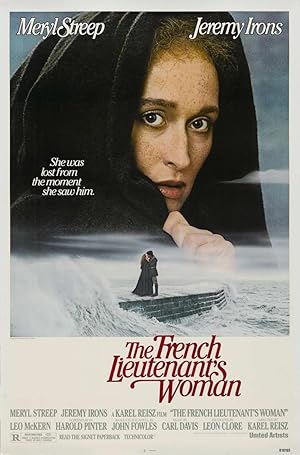
The French Lieutenant's Woman Page #7
- R
- Year:
- 1981
- 124 min
- 705 Views
- I'm Tom Elliott. Who are you?
- My name is Smithson.
- Mama and Papa are abroad.
- Yes. I was looking for a Mrs Roughwood.
I'll find her for you.
- (girl) You put that one in there.
- Mrs Roughwood?
- Mrs Roughwood?
- (woman) She's with Rachel and William.
- Mrs Roughwood?
- Yes?
- Someone to see you.
- All right.
She's working, but she
doesn't mind being interrupted.
Mrs Roughwood?
Mr Smithson?
My solicitor was told
you lived at this address.
- I do not know by whom.
- By me.
By you?!
I've been looking for you for three years.
I broke off my engagement.
I came back for you to take you with me,
to marry you... and you'd gone.
And now all these years later you choose
to let me know you're alive. Why?
I could not do so before this.
- You've married.
- Oh, no, I have not.
I pass as a widow in the world.
- What is this house?
- He is an architect. His name is Elliott.
They gave me shelter a long time ago.
but... I am free to do my own work.
They have encouraged it.
- These are yours?
- Mm. Yes.
You have found your gift.
Why did you leave Exeter?
You told me you loved me.
You showed me your love.
Answer me!
There was madness in me... at that time.
A bitterness, an envy.
I forced myself on you, knowing
that you had other obligations.
It was unworthy!
I saw after you had gone that I had
to destroy what had begun between us!
Are you saying that you never loved me?
- I could not say that.
- But you must say that!
You must say "I am totally evil."
"I used him as an instrument."
"I do not care
that in all this time...
...he hasn't seen a woman
to compare with me...
...that his life has been
a desert without me...
...that he sacrificed everything for me."
- Say it!
- No. No.
Why did you ask me here?
What do you want from me?
- I saw the newspaper advertisements...
- You saw them?
- You read them, and you did nothing?
- I'd changed my name.
You ruined my life
and took pleasure in doing so!
You misjudge me! It has taken me
this time to find my own life!
It has taken me this time
to find... my freedom.
- Freedom?!
- Yes.
To make a mockery of love,
of all human feeling?
Is that what Exeter meant to you? One
brief transaction of the flesh, just that?
...and your "freedom" gives you
licence to twist it in my heart?!
- Well, no more.
- No!
Yes!
Mr Smithson...
...I called you here
to ask your forgiveness.
You loved me once.
If you still love me, you can forgive me.
I know... I know it is
your perfect right to damn me.
But if you do...
...still love me...
Then I must... forgive you.
Yes, you must.
(jazzy dance music)
- Anna. You're going.
- Yes.
- Goodbye. Good journey.
- Bye-bye.
Mike!
Oh, are you going?
Take care.
(car door slams)
(engine starts)
(car drives off)
Sarah!
Translation
Translate and read this script in other languages:
Select another language:
- - Select -
- 简体中文 (Chinese - Simplified)
- 繁體中文 (Chinese - Traditional)
- Español (Spanish)
- Esperanto (Esperanto)
- 日本語 (Japanese)
- Português (Portuguese)
- Deutsch (German)
- العربية (Arabic)
- Français (French)
- Русский (Russian)
- ಕನ್ನಡ (Kannada)
- 한국어 (Korean)
- עברית (Hebrew)
- Gaeilge (Irish)
- Українська (Ukrainian)
- اردو (Urdu)
- Magyar (Hungarian)
- मानक हिन्दी (Hindi)
- Indonesia (Indonesian)
- Italiano (Italian)
- தமிழ் (Tamil)
- Türkçe (Turkish)
- తెలుగు (Telugu)
- ภาษาไทย (Thai)
- Tiếng Việt (Vietnamese)
- Čeština (Czech)
- Polski (Polish)
- Bahasa Indonesia (Indonesian)
- Românește (Romanian)
- Nederlands (Dutch)
- Ελληνικά (Greek)
- Latinum (Latin)
- Svenska (Swedish)
- Dansk (Danish)
- Suomi (Finnish)
- فارسی (Persian)
- ייִדיש (Yiddish)
- հայերեն (Armenian)
- Norsk (Norwegian)
- English (English)
Citation
Use the citation below to add this screenplay to your bibliography:
Style:MLAChicagoAPA
"The French Lieutenant's Woman" Scripts.com. STANDS4 LLC, 2025. Web. 20 Jan. 2025. <https://www.scripts.com/script/the_french_lieutenant's_woman_20264>.


Discuss this script with the community:
Report Comment
We're doing our best to make sure our content is useful, accurate and safe.
If by any chance you spot an inappropriate comment while navigating through our website please use this form to let us know, and we'll take care of it shortly.
Attachment
You need to be logged in to favorite.
Log In